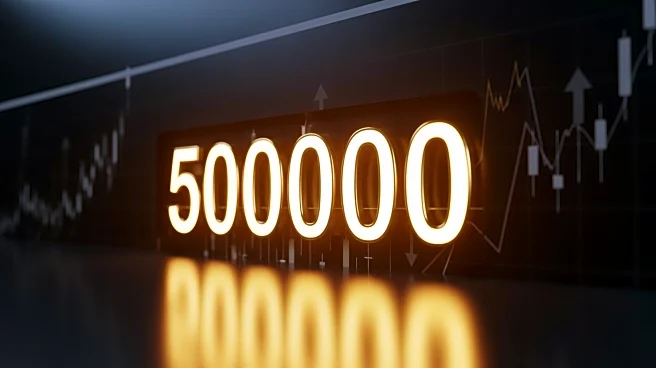What's Happening?
China's economy has experienced a slowdown, expanding at a 4.8% annual pace during the July-September quarter, marking the weakest growth since the third quarter of 2024. This deceleration is attributed to ongoing trade tensions with the United States
and reduced domestic demand. Despite President Trump's imposition of higher tariffs on Chinese imports, China's exports have remained robust, with companies diversifying their sales to other global markets. However, exports to the U.S. fell by 27% in September compared to the previous year. The Chinese government is addressing challenges such as a prolonged downturn in the property sector, which has impacted consumption and demand. Industrial output showed a 6.5% year-on-year increase last month, but retail sales growth slowed to 3%. The World Bank projects China's economy to grow at a 4.8% annual rate this year, slightly below the government's target of around 5%.
Why It's Important?
The slowdown in China's economy has significant implications for global trade and economic stability. As the world's second-largest economy, China's reduced growth can affect international markets and trade dynamics, particularly with the United States. The tariffs imposed by President Trump have strained trade relations, potentially impacting U.S. businesses that rely on Chinese imports. Additionally, the slowdown in China's domestic demand could lead to decreased global demand for goods and services, affecting international supply chains. The property sector downturn in China also poses risks to global financial markets, as it may lead to reduced investment and economic activity. The situation underscores the interconnectedness of global economies and the potential ripple effects of trade policies and domestic economic challenges.
What's Next?
China's government is expected to implement measures to support consumption and the property market, as previous policies begin to lose effectiveness. Economists anticipate a rate cut by China's central bank by the end of the year, which could stimulate spending and investment. The upcoming meeting between President Trump and Chinese leader Xi Jinping during a regional summit may provide an opportunity to address trade tensions and explore potential resolutions. The Chinese government is also convening a significant political meeting to outline economic and social policy goals for the next five years, which could influence future economic strategies. Stakeholders, including businesses and policymakers, will be closely monitoring these developments to assess their impact on global trade and economic stability.
Beyond the Headlines
The economic slowdown in China highlights broader issues such as the impact of protectionist policies and trade frictions on global economic growth. The situation raises ethical and strategic questions about the use of tariffs as a tool for international negotiations and their long-term effects on economic relationships. Additionally, the challenges faced by China's property sector reflect deeper structural issues within the economy, such as excess capacity and price wars in certain industries. These factors may necessitate a reevaluation of economic policies and strategies to ensure sustainable growth. The developments also underscore the importance of international cooperation and dialogue in addressing global economic challenges.
















